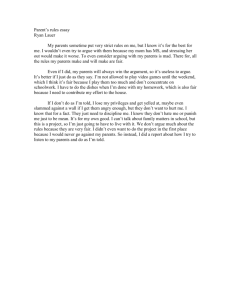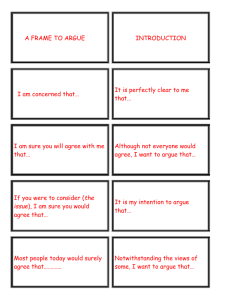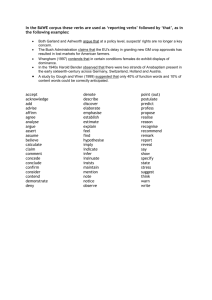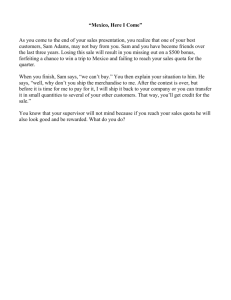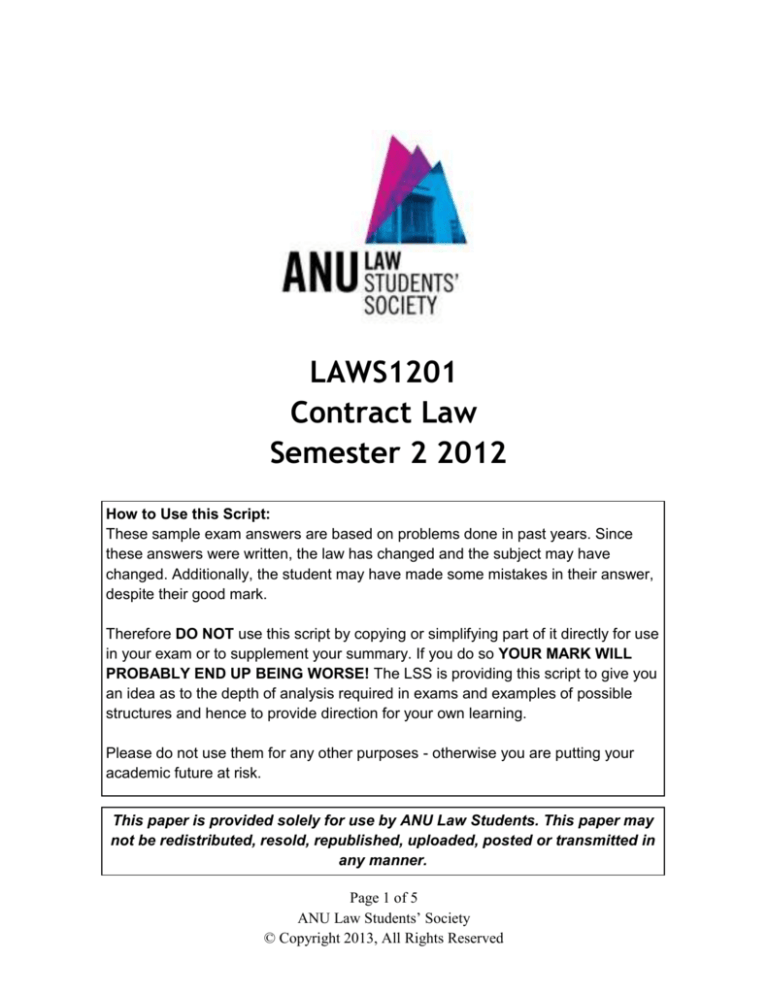
LAWS1201
Contract Law
Semester 2 2012
How to Use this Script:
These sample exam answers are based on problems done in past years. Since
these answers were written, the law has changed and the subject may have
changed. Additionally, the student may have made some mistakes in their answer,
despite their good mark.
Therefore DO NOT use this script by copying or simplifying part of it directly for use
in your exam or to supplement your summary. If you do so YOUR MARK WILL
PROBABLY END UP BEING WORSE! The LSS is providing this script to give you
an idea as to the depth of analysis required in exams and examples of possible
structures and hence to provide direction for your own learning.
Please do not use them for any other purposes - otherwise you are putting your
academic future at risk.
This paper is provided solely for use by ANU Law Students. This paper may
not be redistributed, resold, republished, uploaded, posted or transmitted in
any manner.
Page 1 of 5
ANU Law Students’ Society
© Copyright 2013, All Rights Reserved
CONTRACTS EXAM SEMESTER 2, 2012 – HD
Question 1 – 72%
Advising Elisabeth, it would be in her best interest to argue that the contract had not been validly
terminated. Elisabeth may also be able to argue estoppel.
1. Is there a contract?
Yes it is assumed that there has been offer, acceptance, certainty, intention, capacity and the
Conveyancing Act 1919 NSW in regards to the requirement of writing in contracts for the sale of land has
been complied with. []
2. Issue – Termination
There is an issue of termination as Sam had terminated the contract and is seeking to declare that he has
validly terminated the contract. Elisabeth should try to argue that the contract had not been validly
terminated. []
A. Time Stipulation
Sam will argue that time is essential as it is a commercial contract. However, when time for
performance is extended, this may indicate that the clause as to time being of the essence would
no longer be enforced/waived. In this situation, Elisabeth had failed to pay the first 3 installments
on time (Each a week late) and Sam did not voice any complaints. Elisabeth may therefore be
able to argue that the ‘time is of the essence’ clause had been waived. []
Furthermore, Elisabeth may be able to argue that time is not of the essence, (according to equity
and legislation) unless it is expressly stated. There was no use of the wording “time is of the
essence” anywhere in the contract. Sam may argue that his letter of 9 January may be a notice
making time of the essence. Sam grants time extension until 16 January, and Elisabeth may be
able to use the authority of Laurinda v Capalaba Park to argue that Sam had not fixed a
reasonable time for performance, so it is not an effective notice and does not give rise to a right to
terminate. []
B. Election to Terminate
As it is not stated in the contract what has to be done to elect to terminate the contract, the default
position at common law is that there must be “unequivocal words or conduct showing that an
election to terminate has been done.” On 9 January 2012, Sam tells Elisabeth that he has the right
to terminate the contract but have not indicated that that choice (to terminate) has been made.
Instead, Sam indicated that he had chosen the contract to remain on foot (granting of extension).
Elisabeth may be able to argue that by doing so, Sam had lost the right to terminate. []
However, Sam may argue that his letter stated that it must not be regarded as “varying (his) right
to the strict enforcement of the contract” to argue that acceptance of late payments and granting
of time extension does not stop him from insisting that time is still of the essence (Tropical
Page 2 of 5
ANU Law Students’ Society
© Copyright 2013, All Rights Reserved
Traders v Goonan). Clause 7 of the contract also states that Sam may end the contract without
prior notice.
Hence, it may be unlikely that Elisabeth will be successful in arguing that Sam had lost the right
to terminate, but may be able to argue estoppel. []
3. ESTOPPEL
With reference to Legione v Hateley, this situation is similar in that before the due date for performance,
the purchasers contacted the vendors for extra time, however differentiating the facts of that case to the
case here- Sam, the vendor himself was the one who made the representation, not the vendor’s secretaryso it could be argued that the representation was reliable. [ nicely reasoned]
In order to argue estoppel, Elisabeth has to show that she had relied and acted on that representation and it
would be unconscionable for Sam to terminate the contract. Elisabeth can argue that she had relied on
Sam’s letter and there was only the last instalment left to be paid. It would be unconscionable if Sam were
to terminate the contract as Elisabeth had already paid $164,000 and he would be unjustly enriched if she
was to “forfeit the money she’s paid him”. (But a deposit paid prior to termination may be forfeited).
(Steele v Tardiani) – Sam continually accepted late payments and unjustly enriched. []
Question 2 – 90%
Advise Helen.
Helen is likely to have the right to terminate the contract arising from breach. She may also be awarded
damages.
1. Is there a contract?
Yes. It is assumed that there has been offer, acceptance, consideration, certainty, intention to create legal
relations and capacity. []
Page 3 of 5
ANU Law Students’ Society
© Copyright 2013, All Rights Reserved
2. Issue: BREACH
A. Type of Tea
Sonia had breached the contract by mixing in another type of tea to the Russian Caravan blend.
Helen may be able to elect to terminate the contract as a result of this breach If she can argue that
the type of tea being specifically Russian Caravan only- was a condition. []
To determine whether a term is a condition we apply the Test of Essentiality by (Latham) CJ in
Luna Park. “The term has to be so essential that its non-performance may be considered as
substantial failure to perform the contract at all.” This is the case here, as Helen specifically
entered into the contract for Sonia to supply Helen with Russian Caravan for 12 months. Another
test that can be applied is the one adopted by the High Court in Bancks- “whether the promise
would have entered the contract without being assured of strict/substantial performance of the
promise.” []
In this case, it seems unlikely that Helen would have entered into the contract if it was not assured
that Sonia will supply Russian Caravan to her.
Hence, it is likely that the court will find that Russian Caravan has to be the type of tea to be
supplied and delivered by Sonia – was a condition. Because Sonia had breached this condition,
this gives rise to a right to terminate- so Helen can elect to terminate the contract, and also
awarded damages. []
B. Amount Delivered
Sonia had also breached the contract by not delivering exactly 10 kg each time. The amount to be
delivered could be said to be an Intermediate term (Hong Kong Fir) as there is a variety of
seriousness of consequences if breached. Instead of 10 kg, Sonia had delivered 7kg, 8kg and 9kg
of tea, so the term can and has been breached in a variety of ways. Looking at the severity of the
breach however, it will be unlikely that the court will determine that breaching of 1-3 kg is
sufficiently serious to justify termination. So Helen will most likely be awarded damages for this
breach of intermediate term. []
3. Damages & Exclusion Clause
Sonia may argue that Clause 9 is an exclusion clause, however, Helen can argue that Sonia cannot rely on
it. The primary rule is to read the clause in its natural and ordinary meaning (Darlington), however the
phrase “any defects” is ambiguous. So the clause has to be construed contra proferentum (against the
party whose benefit the clause was included) against Sonia. Then, applying the Four Corners Rule
(Council of City of Sydney v West), Helen has to prove that Sonia had acted outside of ‘four corners’,
going beyond merely breaching the term. Helen can argue that yes in fact Sonia did act outside the scope
of the exclusion clause by her positive act of mixing in another type of tea with the Russian Caravan
blend. (Council of City of Sydney v West). Hence Sonia cannot rely on Clause 9 and will still be liable
for damages. []
Page 4 of 5
ANU Law Students’ Society
© Copyright 2013, All Rights Reserved
To be awarded substantial damages, Helen has to prove that there was quantifiable loss, causation and
remoteness. However it will be difficult for her to prove quantifiable financial loss as so far she had only
received a complaint from a valued customer. So Helen may only be able to get nominal damages. []
4. Helen’s Liability
Helen will still be liable to pay for the blend of tea that Sonia had supplied. Helen still has to pay for
substantial performance and perhaps the amount of Russian Caravan blend can be apportioned to the
amount of other type of tea used so Helen only has to pay for the Russian Caravan (Hoenig v Isaacs).
However if it is too difficult to determine as the blend has been mixed so the blend can no longer be sold
to customers, Sonia may be found to have not substantially performed at all, so Helen would not have to
pay for the mixed blend (Bolton v Mahadeva). [ nicely done!]
5. Frustration
Sonia may try to argue frustration as the reason why she could not make up the quantities of Russian
Caravan but we can look to the Factual Matrix- as allowed by Codelfa to see the factual background
known to parties before contract (Lord Wilberforce in Prenn v Simmonds). In their oral dealing, Sonia
had assured that she will supply “that blend” and there will not be any problem. So Sonia will unlikely be
able to argue frustration. []
Conclusion
Helen will be able to elect to terminate the contract so she can change her supplier and she will also be
awarded damages for the breaches.
Marker’s comments: Outstanding work! A pleasure to mark! Well done!!
Page 5 of 5
ANU Law Students’ Society
© Copyright 2013, All Rights Reserved

